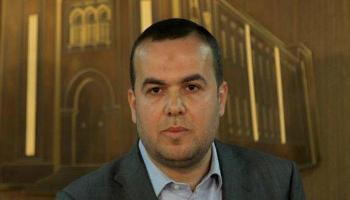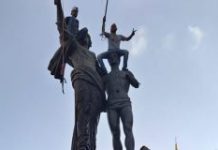A tribunal on the road to Damascus?
Michael Young/The Daily Star/Apr. 16, 2015
The remarks Tuesday by Hezbollah parliamentarian Hasan Fadlallah, deriding the Special Tribunal for Lebanon “as a scandalous breach of Lebanese sovereignty,” were better suited for a stand-up comedy routine.
Hezbollah is a party that Iran created as an instrument to advance its agenda in the region and therefore, almost by definition, undermine state sovereignty. Fadlallah was expressing his support for Al-Jadeed editor Karma Khayat, who Thursday starts facing a trial for obstruction of justice and contempt of court. In a 2012 report, Al-Jadeed unlawfully disclosed the personal details of the witnesses in the trial of the Hezbollah members accused of having participated in the assassination of former Prime Minister Rafik Hariri. This information, of course, should have remained confidential.
In moments such as these, I think of the Al-Akhbar journalist Omar Nashabe, long a critic of the special tribunal. His views only echoed an attitude prevalent at Al-Akhbar, which Nashabe himself helped shape. Nashabe was especially disapproving of the United Nations’ independent investigative commission’s work early on, believing its first commissioner, Detlev Mehlis, had failed to take measures to establish a credible witness protection program.
Today, Nashabe is counsel in the Special Tribunal’s defense office. Yet the court for which he works is about to put on trial a journalist and media outlet for endangering witnesses – pretty much what Nashabe accused Mehlis of doing a decade ago. If one agreed with Nashabe’s views then, it is only natural to apply the same logic today and approve of Al-Jadeed’s being censured, not to mention Al-Akhbar, which also illegally published a list of witnesses.
For the media foot soldiers enrolled in the battle against the tribunal, the latest developments arouse unease. The shoddy work of Mehlis’ successors, Serge Brammertz and Daniel Bellemare, was apparently not enough to neutralize the court, with the current prosecutor, Normal Farrell, going in investigative directions recalling those pursued by Mehlis. For the German former prosecutor, there was never much doubt that the Syrian regime was behind Hariri’s murder, and the witness statements Mehlis took down in 2005 supported this view. Yet public attention was drawn to the “false witnesses” dispatched to mar the U.N. investigation. However, Mehlis always insisted he had based his findings on much more than the testimony of these witnesses.
It’s strange how nobody ever asked what had happened to the testimony gathered by Mehlis, as Brammertz wasted time for two years without bothering to seriously expand his investigation to Syria. Mehlis interviewed Syria intelligence officers and sought to take down Bashar Assad’s witness statement, which the Syrians refused. The Security Council issued Resolution 1636, backing Mehlis in his efforts to conduct his investigation as he saw fit. Yet when Brammertz met with Assad in 2006, he failed to record a formal statement, though he had a mandate to do so.
Brammertz’s integrity was also seriously questioned by a Canadian Broadcasting Corporation documentary in 2010, which accused him of having mismanaged telecommunications analyses, leaving that burden to Lebanese investigators Wissam Eid and Samir Shehadeh. Both made headway and, as a consequence, became the targets of assassination – in the case of Eid a successful one. My own information about Brammertz’s conduct on this front is even more damning of the commissioner’s performance.
Bellemare’s failings were partly explained by the fact that he followed in Brammertz’s footsteps, therefore starting with a substantially empty investigation file. But the Canadian judge did not remedy the situation. Ultimately, he built his indictment around the telecoms analyses that Brammertz had neglected until his last weeks in office. This created a remarkable disconnect.
Bellemare’s indictment, focused as it was on technicalities, offered no motive for Hariri’s assassination. This was an egregious error, one that Farrell, a serious prosecutor, is apparently seeking to address. To most observers Hariri was killed because he intended to challenge Syria and its allies in the parliamentary elections of 2005, and likely would have won a majority with his partners. That is why Farrell has taken the trial in Syria’s direction, bringing to the witness stand individuals who could help consolidate a case for Syrian involvement in the Hariri assassination. Walid Jumblatt’s appearance next month before the tribunal, after that of Hariri acolytes in recent weeks, bolsters such an interpretation.
Hezbollah is unhappy, but should it be? If the trial redirects toward Syrian involvement, the party could argue that it is innocent. While those indicted are party members, Hezbollah could cast doubt on their actions having been the consequence of a party decision. Even if it is unconvincing, this could reduce the heat domestically.
The Syrian regime, in turn, may be taking precautions of its own. Many believe the beating of Rustom Ghazaleh several weeks ago by the men of another intelligence chief may have been linked to the tribunal. Ghazaleh was apparently seriously injured, with unidentified sources telling Al-Hayat that he was “clinically dead.”
Jameh Jameh, Ghazaleh’s deputy for Beirut when he was military intelligence chief in Lebanon, was killed in Deir al-Zor in 2013, reportedly by a sniper. Assef Shawkat, Assad’s late brother-in-law and the overall Syrian military intelligence chief when Hariri was assassinated, was killed in a bomb blast at a meeting of senior Syrian security figures in July 2012.
While it may be impossible to determine if these deaths were related to the Hariri affair, in practical terms they may have severed ties between the Syrian regime and the assassination, because military intelligence was at the heart of Syria’s Lebanon policy. With the Assad regime worried that the prosecution could expand its indictments and call Syrian officials to testify, wiping the slate clean may be advisable. In the months ahead we will see what Farrell does. But for now Khayat’s trial shows that the special tribunal is gaining in confidence and perhaps moving forward.
**Michael Young is opinion editor of THE DAILY STAR. He tweets @BeirutCalling.
















